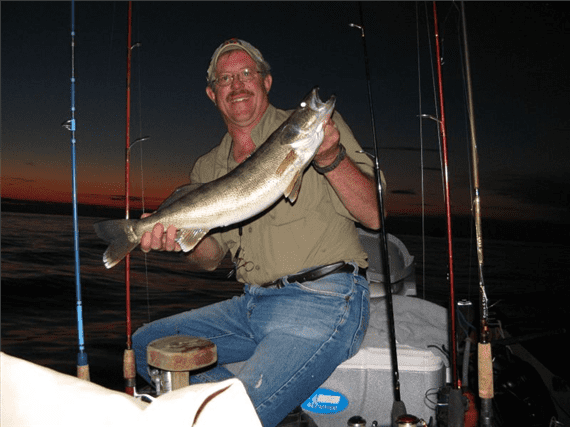Exercising the After-dark Option for Fishing Success
Dan Armitage 11.20.13

If daylight hours are the only time you’re wetting a line, you’re missing some prime angling action. It’s not for everyone, but after-dark efforts can reap huge rewards for fishermen who adjust their schedules, tweak their methods, and rig their boats for night fishing. A side benefit of night fishing is the peace and quiet it offers on waters that may be crowded with other boaters while the sun is up.
Most fishermen realize that the low-light periods that begin and end each day are when fish are apt to be most active and receptive to taking a bait. In the “golden hours” immediately after dawn and just before twilight, the lack of direct light gives predators the advantage over their prey, and everything from sunfish to salmon cram as much feeding effort into the transition period as possible. What some anglers don’t realize is that the end-of-the-day feeding frenzy often continues into—and sometimes through—the night, and may not even peak until most fishermen are tucked away in bed.
Famous night-feeders
A good example of a gamefish that puts on an after-dark feedbag, especially in the fall, is the walleye. Walleyes got their name because of their distinctive “opaque” eyes, which allow them to see better than the average fish in low-light conditions. Come autumn, walleye put their special sight feature to full advantage, when they are prone to pushing schools of baitfish toward shore, pinning their meals against rocky shorelines, piers, or beaches, and picking off the minnows one by one. Slowly trolling shallow-diving, minnow-imitating crankbaits that match the size and shape of the primary forage, or anchoring and casting those types of lures along shorelines that host the autumn night-bite, are popular tactics for hooking late-season walleyes across much of their range.
Largemouth bass are another species that can often be caught more easily at night than in the day. Fishing noisy, dark-colored surface lures that the fish can locate by sound and silhouette against the lighter night-sky is as productive as it is exciting. In fact, the world record largemouth fell victim to a surface lure being fished at night.
Catfish are another gamefish species that feed much more readily at night and are famous fare for anglers who prefer to fish after dark. Like the walleye, a look at its eyes speaks volumes about how a catfish finds its prey. Unlike the walleye, a catfish’s eyesight is under-developed to the point that its eyes are extremely small in proportion to the rest of the body. That’s because catfish don’t rely on sight to locate their food, instead they use their enhanced sense of smell, and the sensitivity of their “whiskers” which feel and “taste” objects, to find food. That explains why “stink baits” are popular catfish baits and why catfish don’t need the light of day to find them; they simply follow the scent tail.
Another reason catfish are such willing night-biters is that they are actually more sensitive to light, despite the small size of their eyes, than other fish. For that reason, they often move about more at night in search of food, spending the daylight hours beneath undercut banks, in the shadow of logjams, or submerged in the depths where there is minimal light penetration. Serious after-dark catfishermen usually keep the use of light aboard their boats to a minimum for that very reason.
Other gamefish flock to light, especially when it’s broadcast at night, and are pushovers for anglers presenting baits around artificially produced illumination. Crappie make a beeline for underwater lights or lights shining down into the water from the deck of a boat. White bass can be attracted to electric light as well, as can walleye during the summer months. The walleyes keep to the perimeter of the light, but the bass and crappie often move right into the glow to take minnows or small jigs.
Night fishing is not for everyone, but with the proper lighting and safety factors in mind—you might find after-dark angling to be just your cup of tea.

